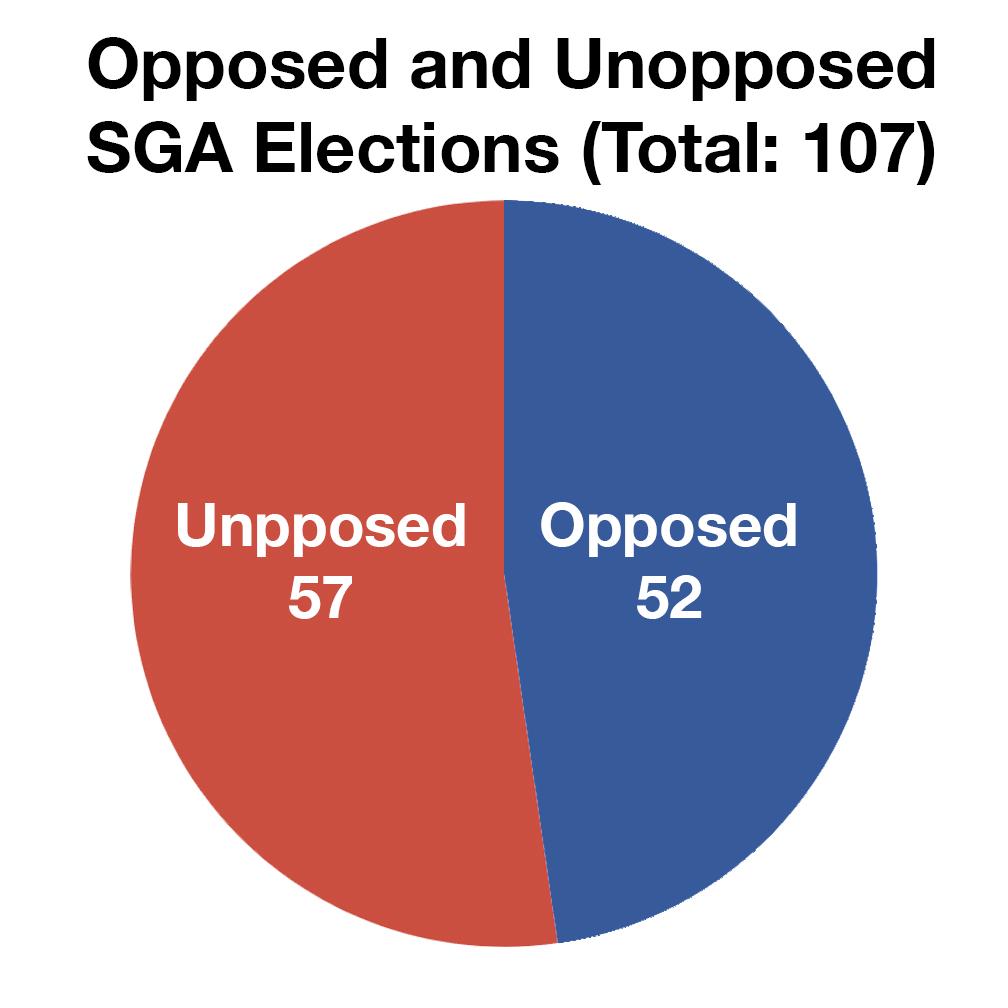Over half of the candidates who ran for positions in the Student Government Assembly ran unopposed, according to SGA’s Elections Commission.
SGA, the university’s main representative body, proposes resolutions that impact student life or university policy. From encouraging the university to divest from fossil fuels to supporting a push to have school off on Jewish holidays, SGA serves as the student body’s voice in conversations with the administration. Some 2019 candidates cited a lack of definitive action by the body and disinterested potential candidates as reasons for the large number of unopposed elections. Student government leadership did not respond to multiple requests for comment by time of publication.
Tisch first-year Holly Nance was the only person to run for president of Tisch School of the Arts and will serve on SGA in the fall. Nance has experience running events and attended all e-board meetings the past two semesters as the new student representative for Tisch.
When first considering running for president, Nance said she was worried about stepping on older members’ toes, but quickly realized that no one else was planning on running anyway.
“Most people just want to keep their position on the executive board,” Nance said. “[President] has a lot more responsibility. I think there’s a lot of value to being on the e-board and not in a president or senator role, where you don’t have to go to SGA.”
Nance said she endorsed candidates for other positions on the e-board during election season.
“I didn’t really feel like I was running because I was unopposed,” Nance said. “I didn’t campaign or anything.”

Steinhardt junior Sharon Kim was unaware of who was running for student government and how to vote for elections and said this lack of awareness by students may contribute to fewer competitive elections.
“It sounds like students don’t really care, to be honest, me included,” Kim said. “We don’t really know exactly what they do. It reflects students attitude or doubt of ‘Do students really have a say or power over what happens at our school?’”
Tisch junior Kyle Quick said although he sees the amount of unopposed elections as a problem, his own unawareness of student government prevents him from having a stronger opinion on the matter.
“It’s a participation issue,” Quick said. “I mean I don’t know who any of these people are so I’m not really upset about it — it’s hard to formulate an opinion on the idea of people getting the position because they’re the only one that went for it, when I don’t know what the council itself does.”
Students were notified through a university-wide email by the Center for Student Life that they could vote using the link studentvote.nyu.edu, although some students remained unaware of the process.
“I didn’t even know the link had gone out, and I was running,” Nance said.
Current Stern School Senator and junior Papa Yaw Sencherey was recently elected president of Stern after running against Farjad Malik, a junior in Stern’s Business and Political Economy program. To run for Stern president, a candidate must have served on the e-board previously, which Sencherey said may have limited the pool of candidates.
Sencherey said he feels some of the perceived lack of interest in student government may stem from what he sees as insufficient action by the body.
“I don’t think, in these past two or three years, student council has been as great as it can be,” Sencherey said. “Making sure our name is known out there, making sure people know student council isn’t just an event planner, it’s not a BS club — it’s somewhere you can actually go, make change happen, do things. But in order for that to happen, students need to start seeing us actually do things.”
As a school senator, Sencherey hosted three town halls about socioeconomic and other identities within Stern, mental health during recruiting season and being an ally to the LGBTQ community and to other minority groups. Sencherey said that as president next semester, he’d like to begin taking action based on the information from the town halls. For example, he’d like to find a way to fund suit purchases for low-income students, an issue brought up at his first town hall. In Stern, being able to wear business formal attire is required for many activities and events, according to Sencherey.
Sencherey said more definitive action by student government could improve participation.
“I feel like the reason why a lot of these elections were unopposed is because students don’t know if they want to take a leadership role in something that they don’t think is doing anything,” Sencherey said.
A version of this article appeared in the Monday, April 22, 2019, print edition. Email Victor Porcelli at [email protected].





















































































































































